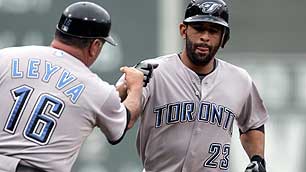World Hockey Summit – Day 4
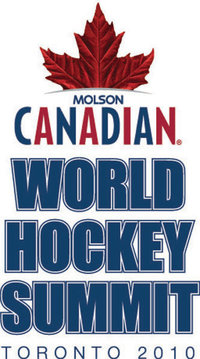 The fourth and final day of the 2010 World Hockey Summit focused on moving hockey forward and continuing to spread the good word about Canada’s favourite sport.
The fourth and final day of the 2010 World Hockey Summit focused on moving hockey forward and continuing to spread the good word about Canada’s favourite sport.
After an early breakfast the conference met in the Toronto Sheraton’s downstairs hall to listen to players, coaches and organizers speak about the movement to promote women’s hockey.
Like the previous day’s sessions on the Olympics and a World Hockey Agenda, all the members of the panel acknowledged that the 2010 Vancouver Games had done wonders for their sports’ public profile.
However, unlike Wednesday’s slanging match, keynote speaker Hayley Wickenheiser and the panel of Mel Davidson, Mark Johnson, Arto Sieppi, Angela Ruggiero and Peter Elander all agreed that women’s hockey had to return to the Olympics as well as stage more international and even professional matches.
Ruggiero made an important point about high calibre women’s play: as a member of Team USA she plays, on average, ten games per year. That’s it.
Once a player graduates from the NCAA, there is no viable professional women’s league. An individual looking to improve their game beyond the confines of a varsity program has to arrange her own ice time and practicemates, a surprisingly difficult task.
This lead to a lengthy discussion amongst the panel, and later amongst the break-out groups, about how to go about creating a professional women’s league that would allow elite female players to hone their skill and provide aspiring hockey players with ready-made heroes.
Promoting hockey to women dovetailed perfectly with the afternoon’s session on Growing Participation in hockey.
Tommy Boustedt of Sweden, Sieppi (again) of Finland, Scott Smith of Hockey Canada and Pat Kelleher of USA Hockey all discussed the particular challenges of promoting hockey in their respective countries.
Both Sweden and Finland focus on education of coaches, players and parents through intensive hockey schools open to all amateur players, while USA Hockey is concerned with branching out past the Three Ms: Michigan, Massachusetts and Minnesota.
Canada, of course, doesn’t have to worry about popularizing the game or breaking into new markets. Instead, their focus is on developing accessibility for low-income families and New Canadians as well as promoting women’s and sledge hockey.
Dr. Paul Dennis of the Canadian Hockey League, Cyril Leeder of the Ottawa Senators and John McDonough of the Chicago Blackhawks also contributed by addressing how their organizations interact with local communities to promote hockey and win over new fans to the game.
Although it was the least exciting of the presentations, that final session served as a fitting end to four days of hockey talk. It put a positive spin on the Summit and insured that the hundreds of delegates would be energized to go out and continue their hard work.
World Hockey Summit: Day 3
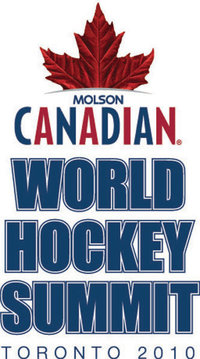 Debate over the National Hockey League’s role in international hockey, especially the Winter Olympics, built to a crescendo at the World Hockey Summit yesterday.
Debate over the National Hockey League’s role in international hockey, especially the Winter Olympics, built to a crescendo at the World Hockey Summit yesterday.
International Ice Hockey Federation President Rene Fasel had started thumping the war drums on Tuesday when he warned the NHL that they would expand to Europe “over his dead body”.
During that same question and answer session with TSN’s Gord Miller he called for professional hockey players to play at the 2014 Winter Olympics at Sochi, Russia.
Wednesday morning there was an evaluation of the 2010 Olympics, with Fasel, Vancouver Organizing Committee CEO John Furlong and International OIympic Committee member Timo Lumme speaking about the great success and popularity of hockey at this year's Games.
All three emphasized that the 114 million worldwide viewers of the USA-Canada men’s hockey final had been drawn, in part, by the fact that it was a best-on-best game that featured NHLers.
After the keynotes were done, Miller, acting as moderator, allowed IIHF member Igor Kuperman, sports marketing guru Brian Cooper, Detroit Red Wings general manager Ken Holland, Ottawa Senators captain Daniel Alfredsson and New Jersey Devils captain Jamie Langenbrunner to respond.
Not surprisingly, all five panellists supported the NHL’s return to the Olympics, with only Holland showing any kind of hesitation. The successful GM had many concerns about scheduling and injury issues affecting the success and health of his professional club.
When discussion broke out amongst the hundreds of delegates in attendance, there was an easy consensus that the NHL and Olympics need each other for the fans and the good of the game.
After lunch, NHL Commissioner Gary Bettman had a Q+A with TSN’s Pierre Maguire. During the interview Bettman repeatedly said there were pros and cons to sending his players to Sochi.
“We haven’t said ‘no,’” said Bettman. “And anybody who suggests that we’ve made a decision or suggests I’m anti-Olympics doesn’t get it, because what we’ve been simply saying is, ‘it’s a mixed bag.’”
Bettman stressed that he was commissioner when the NHL first started playing in the Olympics at Nagano, Japan, four cycles ago and that he has always been interested in exposing the sport to as many people as possible.
Many had expected that Bettman’s half-hour session was going to be the most heated event of the day. However, it was the follow-up discussion of a Global Event Agenda that was really contentious.
Moderated by Darren Dreger, the panel began with a thoughtful presentation by Edmonton Oilers associate coach Ralph Krueger, who had served as head coach of the Swiss national team at the Vancouver Olympics.
Krueger proposed a new schedule for international events, featuring the Olympics every four years, a World Hockey Championship during the intervening years and an under-23 world championship during Olympic years.
He also suggested that the Victoria Cup, an annual club championship between two European teams and two NHL teams, should be revived.
Miller then opened the floor to the panel of NHL Deputy Commissioner Bill Daly, Kontinental Hockey League President Alexander Medvedev, Team USA and Toronto Maple Leafs GM Brian Burke, NHL alum Anders Hedberg, former NHL goaltender and prominent NHLPA member Glenn Healy, NHLPA representative Mike Ouellet and IIHF member and broadcaster Paul Romanuk.
Although things began reasonably as each panellist said their piece, Fireworks ensued when they had the chance to rebut each other.
Generally speaking, Burke and Daly presented the case for the NHL staying out of the Olympics, highlighting that it put teams’ assets – the players – at considerable risk of injury. They were also concerned that the interruption in the professional season damaged the momentum of small-market teams.
“The Olympics don’t hurt the Toronto Maple Leafs, it doesn’t hurt our business model,” said Burke, the former GM of the Mighty Ducks. “But in Anaheim it does. In Nashville, it does. In Florida, it does.”
They were opposed by Healy and Ouellet, who as representatives of the players’ association, felt that their constituency should be allowed to play when and where they wanted, and that practically all NHLers would love to play at the Olympics.
Panellists outside of the labour politics of the NHL like Medvedev, Hedberg and Romanuk also chimed in with their concerns, although all three were adamant that the Olympics should be a “best-on-best” tournament.
The debate laid bare many of the tensions at the highest levels of hockey.
Everything from the ongoing labour disputes between the NHL and NHLPA, the lack of communication between the NHL and IIHF, the competing styles and values of European and North American hockey as well as the emergence of the KHL as a threat to NHL supremacy were all on display.
There were many dramatic moments, including Healy wondering aloud why Burke cared so much about when the World Hockey Championships were scheduled, since the Maple Leafs are always available when the tournament begins in April.
Alliances also shifted quickly in the swirling debate. When a doctor from the IIHF spoke from the floor to correct Healy’s impression that the quality of medical care provided at the Olympics is sub-par, the former Toronto goaltender saw his nemesis Burke leap to his defence.
Similarly, when another delegate called out Burke and Daly saying that it was a simple issue and that he was sick of hearing excuses about NHLers playing in the Olympics, Ouellet and Healy both allowed that it was a complex issue.
Burke was the most energetic debater throughout, taking on all comers from the stage and the floor of delegates, although Daly, Ouellet and Healy were very active as well. It was an exciting and intriguing show that had delegates buzzing for the rest of the day.
Today’s topics will be Women’s Hockey in the morning and Growing Participation. It’s hard to imagine that those panels will be nearly as heated, but you never know.
World Hockey Summit: Day 2
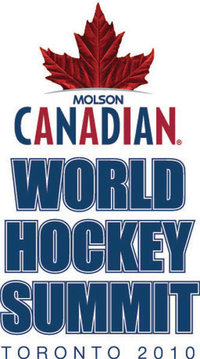 After nine hours of panels, group work, questions and answer periods as well as informal discussions over food, one thing is clear at the 2010 World Hockey Summit: the amateur hockey system has to change.
After nine hours of panels, group work, questions and answer periods as well as informal discussions over food, one thing is clear at the 2010 World Hockey Summit: the amateur hockey system has to change.
Whether it was cautions from Dr. Steve Norris or Dr. Mark Aubry on the overly demanding training in youth hockey during the morning’s Player Skills Development session or the dire warnings of Czech National Program Director Slavomir Lerner of the talent drain from Europe to North America, it was plain as day that things need to change.
Although it’s difficult to sum up nearly six hours of presentations, the general consensus was that minor hockey associations are too focused on turning young players into National Hockey League superstars, sapping the game of its fun and making it excessively dangerous.
As panellist Brendan Shanahan said “How come I don’t hear about kids playing shinny anymore?”
The speakers spoke of multiple concussions to eight and ten year-olds, massive dropout rates in children’s hockey (44% of American hockey players have stopped playing by the age of nine) and a dwindling European junior system robbed of its best talent by the superior Canadian Hockey League.
During question and answer periods as well as in break-out discussion groups the delegates and officials in attendance at the WHS brainstormed ideas that could make amateur hockey fun again for the casual player, while creating a more practical Long Term Athlete Development plan for adolescents and teenagers who want to become professionals.
The idea that was most popular – garnering a round of applause from the Air Canada Centre’s floor when it was suggested – was raising draft eligibility from 18 to 19.
Many groups of delegates had come up with similar concepts including raising the draft age to 20 or forcing players to stay in midget for a minimum of two years and junior for three. A freeze on all international movement at the junior level was also a common theme.
One radical suggestion was to raise draft eligibility to 19, but allow NHL teams to take 18-year-old players at the cost of two draft picks. So a Sidney Crosby-type player would have cost the Pittsburgh Penguins their first and second-round draft picks.
It was an informative and exciting day of hockey talks, and I’d strongly recommend that you follow the above links to see video of the panel discussions. Also, if you want up-to-date quotes from the day’s events follow me on Twitter.
Today’s discussions will start with an evaluation of hockey’s role at the 2010 Vancouver Olympics, then a Q and A with NHL commissioner Gary Bettman and then finish off with an afternoon session on Establishing a Long-Term Global Event Agenda.
World Hockey Summit: Day 1
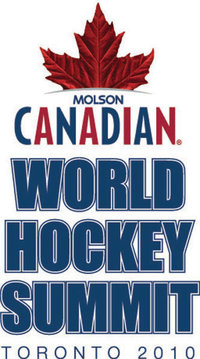 As I mentioned on my Twitter feed, I will be attending the 2010 World Hockey Summit this week, with lots of LiveTweeting on my feed and daily blog posts summarizing what I’ve learned.
As I mentioned on my Twitter feed, I will be attending the 2010 World Hockey Summit this week, with lots of LiveTweeting on my feed and daily blog posts summarizing what I’ve learned.
Hockey Canada is organizing the conference, bringing together hockey organizers, players and coaches from around the world to discuss the future of the game and improve on safety.
In the words of Hockey Canada President Bob Nicholson, the Summit will “provide an inclusive forum to table the most pressing questions surrounding our game and work together to find implementable solutions.”
Day 1 was very straightforward. It was basically clear from nine until five, giving all the attendees a chance to register and settle into their accommodations in downtown Toronto.
Tonight there will be a Hot Stove Session at the Hockey Hall of Fame where four panels rotate from room to room, discussing Contracts and Transfers, Agents’ Role in Working with Young Players, State of the Game and Comparisons of the International and North American Game.
Unfortunately, I’ve got previous commitments for tonight, so I’ll be missing out on those talks. They do sound very interesting though, and I’ll try to get my hands on a recap of the discussions to share here.
Tomorrow will start with a continental breakfast at the Air Canada Centre, home of the Toronto Maple Leafs and the National Hockey League’s Canadian office. There’ll then be a three hour session on Player Skills Development.
At one in the afternoon, Rene Fasel, the President of the International Ice Hockey Federation, is going to have a half-hour Q+A period.
Next up is the session that I am most interested in: Junior Development in the Hockey World. The reason is fairly obvious – as junior hockey editorial assistant for the Canadian Press, this is my wheelhouse.
It’s going to be a lot of fun and interesting week. Please, check back here tomorrow night or my Twitter feed throughout the day to see what it’s all about.
At long last, MMA has arrived in Ontario
 It took a couple of reversals, but Premier Dalton McGuinty has finally made the right decision and ruled that professional mixed martial arts fights can be held in Ontario, paving the way for a lucrative Ultimate Fighting Championship card in Toronto sometime in 2011.
It took a couple of reversals, but Premier Dalton McGuinty has finally made the right decision and ruled that professional mixed martial arts fights can be held in Ontario, paving the way for a lucrative Ultimate Fighting Championship card in Toronto sometime in 2011.
I’ve long supported this move, including a lengthy blog post in February after McGuinty said that the ban on MMA was not going to be lifted.
But now that the Premier has changed his mind, it’s worth repeating some of the arguments in favour of the emerging sport.
As most proponents of MMA have argued, it’s actually the safest of the combat sports because the referees have more discretion to stop the match and as a result are more proactive in ending lopsided bouts.
As a result, unlike boxing’s standing counts, once a fighter has sustained a serious blow to the head, the match is over. This prevents concussions and long-term brain damage.
Old school sports commentators often complain about the blood and savagery of the sport, while championing traditional combat sports like boxing, wrestling, judo and tae kwon do.
This is a weak argument on their part. After all, MMA incorporates strategy and training from all of those disciplines. There’s no case to be made against the submission moves of the UFC when wrestling, one of the world’s first Olympic sports, relies on many of the same moves.
Further, prizefights were already being held on some Native reserves. Legalization province-wide would mean that better, more expansive safety regulations would be created, insuring that mixed martial artists would be guaranteed higher safety standards.
There is also the economic benefit. Toronto is a sporting city and the home base for almost all of Canada’s major media outlets. A major MMA event here would expose the sport to even more people and create a buzz around the industry.
In their press releases the Ontario government has estimated that it’ll generate approximately $6 million for Toronto-area businesses.
I’m no economist and I don’t know how these estimates work or how accurate they are, but obvious that like any big event - concert, conference, festival, whatever – a UFC event would provide a boost to Ontario’s economy.
Without getting too political, I will say that it’s nice to see that Premier Dalton McGuinty changed his mind and is, at long last, welcoming mixed martial arts and promoters like the UFC to Ontario. It's one of those rare win-win situations: it will be good for the sport and for the province.
My latest for Hockey Prime Time
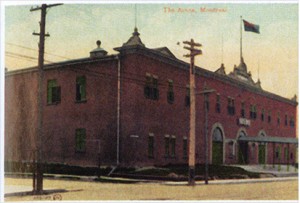
Recognize this place? It's one of my top 10 arenas in NHL history. Hover your cursor over the picture for the answer.
As long-time readers of this blog know, I’m involved with a hockey website called HockeyPrimeTime.com. It’s a great site that offers up news and analysis of the National Hockey League as well as hockey around the world.
Normally I’d be writing some notebooks on the comings and goings of the NHL’s Northeast division.
However, since there’s no hockey on right now we’ve been putting together a series of Top 10 lists. I’ve contributed two articles to the project and I’m really proud of both of them.
Most recent was my list of the Top 10 Arenas in Hockey History. A few recent rinks that made the list are Toronto’s Air Canada Centre, Detroit’s Joe Louis Arena and Philadelphia’s Spectrum.
My other Top 10 list was posted about a week ago and breaks down the Top 10 Most Influential Individuals in NHL history. I had a blast writing it. Like my work with Canada’s Sports Hall of Fame I got to combine my interest in history with my love of hockey.
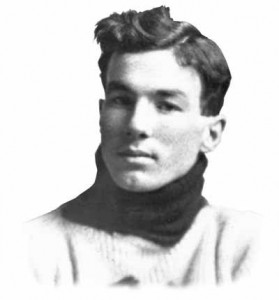
Recognize this guy? He's #9 on my list of the most influential people in NHL history. Hover your cursor over the picture for his name.
I think my list of ten influential people will surprise some people and hopefully it’ll also introduce people to some players and builders who don’t get enough credit for shaping the modern NHL. I also feel that some people will be surprised at who is at the top of the list as the most influential man in NHL history.
In any event, it was a lot of fun putting these lists together.
What do you think the most significant hockey arenas are in hockey history?
What about influential people? Do you think I missed anyone?
Come playoff time, the LeBracle doesn’t change much
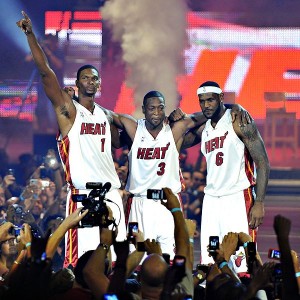 It’s been weeks and the National Basketball Association is still reeling from LeBron James’ hour-long ESPN special called the Decision where he announced that he was joining Dwyane Wade and former-Toronto Raptor Chris Bosh on the Miami Heat.
It’s been weeks and the National Basketball Association is still reeling from LeBron James’ hour-long ESPN special called the Decision where he announced that he was joining Dwyane Wade and former-Toronto Raptor Chris Bosh on the Miami Heat.
The fans of James’ former team, his hometown Cleveland Cavaliers, went crazy. Pure guano. Owner Dan Gilbert wrote an open letter calling the former Ohio hero a coward and compared him to reviled American traitor Benedict Arnold.
Commentators around the Association thought that Gilbert had maybe gone too far, but they understood his position. No one could understand LeBron’s thinking.
Many basketball experts bemoaned the fact that Michael Jordan, Larry Bird and Magic Johnson would have never done something like this. That era of superstars wanted to beat each other, not join forces. The competitive balance of the league had presumably been ruined with Wade, Bosh and James conspiring to move to South Beach.
I agree to an extent. James’ decision to announce on a nationally televised infomercial that he was leaving his hometown team – without first warning the Cavaliers – was a disaster. It was ham-handed and poorly considered. Although Gilbert’s rhetoric was over-the-top, I totally understand why he’s upset.
But this noise about the competitive balance of the league being ruined is ridiculous. Simply put, the NBA doesn’t nearly have the parity of other leagues.
The NBA is not like the National Football League where any team can stun the world and win the Super Bowl. It’s not like the National Hockey League where teams can fall prey to tougher, more determined clubs in the postseason.
A scenario like the 2010 Eastern Conference playoffs where the Washington Capitals and Pittsburgh Penguins – arguably the two best teams in the East – were knocked off by the opportunistic Montreal Canadiens just would never happen in the NBA.
No, every year there are a maximum of four basketball teams that stand a realistic shot at winning the Larry O’Brien Championship Trophy. Look at this breakdown of picks from NBA.com’s experts for the 2009-10 season.
All 12 experts believed that the Boston Celtics, Cleveland Cavaliers and Los Angeles Lakers would win their divisions. Only Vince Thomas picked the Dallas Mavericks and Atlanta Hawks to win their divisions. Otherwise, it was unanimous that the Orlando Magic and San Antonio Spurs would win the Southeast and Southwest.
The Northwest division was the only group to create any kind of controversy with three commentators picking the Denver Nuggets.
When it came to conference champions, the East was perfectly split between Boston and Cleveland, while the Lakers got 10 votes to San Antonio’s two in the West.
I’m a pretty casual basketball fan, and even I would have guessed at the Celtics or Cavaliers facing Los Angeles in the NBA Finals. The Spurs are a bit of a curveball, but they were still a pretty obvious pick.
Not surprisingly, the experts were right. The Lakers did play Boston, after the Celtics had eliminated Cleveland.
So for 2010, we have to assume that the Lakers and Boston are still going to be competitive clubs. Cleveland will be adrift without LeBron, but they will be easily replaced by the Heat as one of the new favourites in the East.
In other words, there are still three teams – and only three teams – that really have any kind of chance to win the championship.
You can say a lot about LeBron James’ move to the Miami Heat. In fact, a lot of people have. But it can’t be argued that it’s ruined the parity of the league.
Ultimately, the competitive balance will stay the same in the NBA, with only a few teams having any kind of legitimate chance at winning the title. It just so happens that now one of those teams are based in Miami and not in Cleveland.
Graphic Novel Review: The Rocketeer: Complete Adventures by Dave Stevens
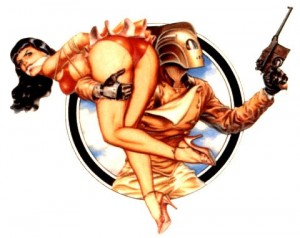 Sometimes it’s hard to articulate your feelings about a book or movie. Other times it just comes to you, like when I recently finished reading The Rocketeer: the Complete Adventures, a reprinting of Dave Stevens’ seminal series that was originally published n 1982.
Sometimes it’s hard to articulate your feelings about a book or movie. Other times it just comes to you, like when I recently finished reading The Rocketeer: the Complete Adventures, a reprinting of Dave Stevens’ seminal series that was originally published n 1982.
I found myself saying: “Really? That’s it?”
Not that it was a knock on the content of the book. The artwork is gorgeous and really pops thanks to the re-colouring done for this edition by Laura Martin. Stevens’ stories are good too, with some decent action as stunt pilot Cliff Secord learns to use a stolen jetpack and win back his best girl, Betty.
Stevens does an excellent job of building a sense of suspense, particularly in the second story “Cliff’s New York Adventure”. It’s a nice touch that he incorporated his hero into the Wold Newton Universe, having him work alongside the Shadow and with associates of Doc Savage.
But that’s the final story. There’s only two.
This was not what I was expecting, at all. As I made my way through the book I was waiting a third and final act that would match up with the ending of the 1991 film adaptation starring Billy Campbell and Jennifer Connelly. That climax never comes.
Instead, the Complete Adventures end with Secord leaving New York City for Los Angeles, with the expectation that he’ll be reunited with his girlfriend Betty. There should be another third to this book, but it just ends on that note. It’s an anti-climactic end to an otherwise enjoyable book.
I guess that’s the rub: those first two stories really are great. They’re fun and pulpy and in many ways are like Alan Moore’s Tom Strong.
But with any of the Tom Strong books there’s a sense that these are just a few of hundreds if not thousands of stories, and theyère much more detailed and fulfilling. The Rocketeer leaves you hanging.
It’s a shame that there wasn’t more to the series, and even worse, there never will be since Stevens passed away in 2008.
All in all, The Rocketeer: the Complete Adventures is a fun read and it has gorgeous artwork, but it’s disappointing that it’s so short and, ultimately, feels incomplete. It's a great concept, I just wish there was more of it.
If you’d like to read a second opinion, I’d recommend Chris Sims’ review of the Complete Adventures from December 2009.
What’s in a sport?
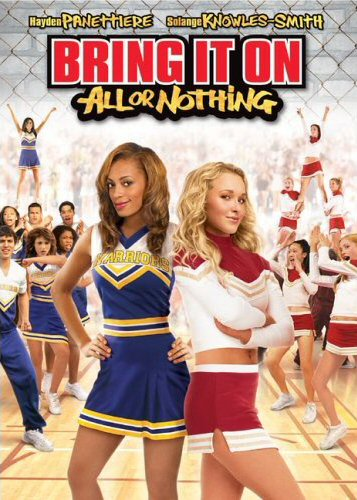 Last week an old chestnut of an argument reared its head when a judge ruled that according to NCAA and Title IX rules competitive cheerleading is not a sport.
Last week an old chestnut of an argument reared its head when a judge ruled that according to NCAA and Title IX rules competitive cheerleading is not a sport.
Quinnipiac University in Hamden, Connecticut had cancelled their women’s volleyball program in favour of the seemingly more lucrative cheerleading team. The volleyball team’s coach sued on the grounds that cheerleading doesn’t meet NCAA rules or the Title IX law.
Using those standards the judge ruled that volleyball is more of a sport than its peppy replacement.
Almost immediately there was an outcry from the cheerleading community, crying foul and defending the honour of their beloved athletic pursuit. This brings us to that previously mentioned chestnut: what constitutes a sport?
Hampton Stevens wrote a well-considered response to the debate for the Atlantic’s website today. He argues that cheerleading is not a sport because the winners are decided by a subjective judging system.
In Stevens’ mind there are three qualities to a sport:
- People compete at it.
- Computers can't do it.
- Aesthetics don't count.
He cites examples too. Chess is not a sport because computers can play it. Croquet is a sport though, because there is a clear objective measure of the winner.
I agree with Stevens in principle. In fact, a source of much acrimony in my household this winter was my ongoing criticism of several of the “non-sports” at the Vancouver Olympics.
Like Stevens, I place a great deal of importance on the objectivity of the activity. As soon as judges are holding up signs with scores, I lose interest. However, even I can see a glaring omission in Stevens’ argument: boxing and other combat sports regularly go to a judges’ decision.
If there’s a close match, the judges have to decide the bout based on who dominated the fight, particularly which boxer landed the most head shots on their opponent. In other words, they have to decide how well each pugilist boxed. They have to judge the match on the aesthetics of each fighter’s strategy and style.
Judges miss landed blows and there’s often some interpretation of what is and isn’t a head shot. Also, we’d be kidding ourselves if we thought boxing judges were not corrupt or biased.
I’m not saying that boxing is as subjective as cheerleading or figure skating, but I think it’s important to acknowledge that all sports have a certain aesthetic aspect to them – even in the most cut-and-dry sports like sprinting judging can play a significant role in false starts and photo finishes.
That said, Stevens and the Connecticut judge are both right: cheerleading is far too subjective to be considered a sport.
Twitter buzz - While writing this article I posed the question to my Twitter followers:
@jchidleyhill Is cheerleading a sport? What constitutes a sport?
I got a few responses from my followers, including:
@rubedawg83 - Competition based on participants using BOTH physical and mental tools. Cheerleading - Yes, Chess & Fishing – No
@ToryBachmann - [...] Yes cheerleading is a sport
@Novinarwriting - Hmm Hard to take 'sports' shows like pool/darts/poker seriously
@twharry - Any sort of athletic activity where you can legitimately pull a groin while competing is a sport.
